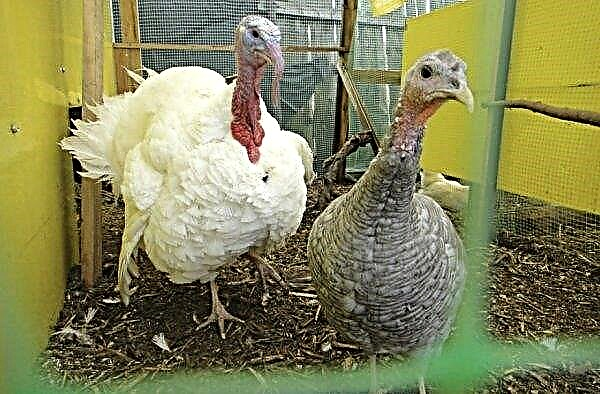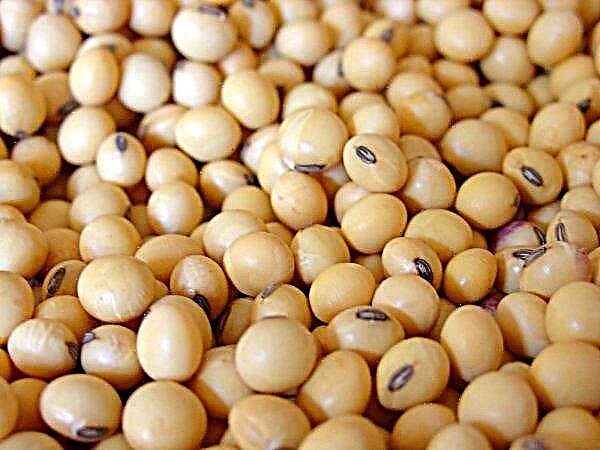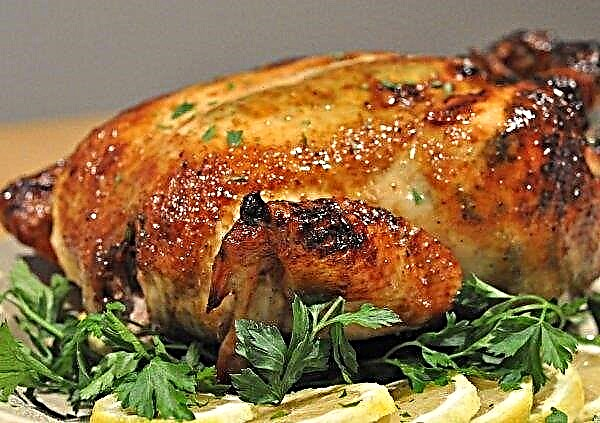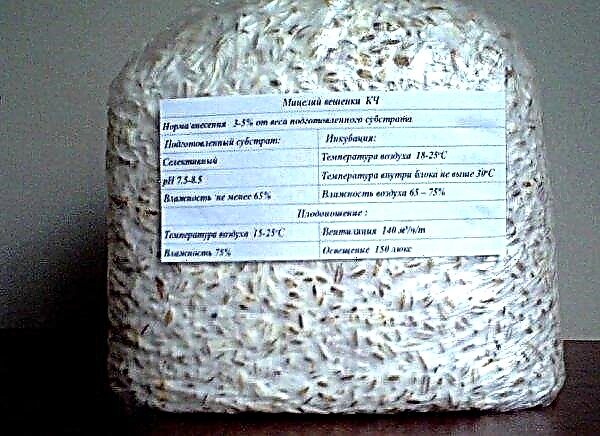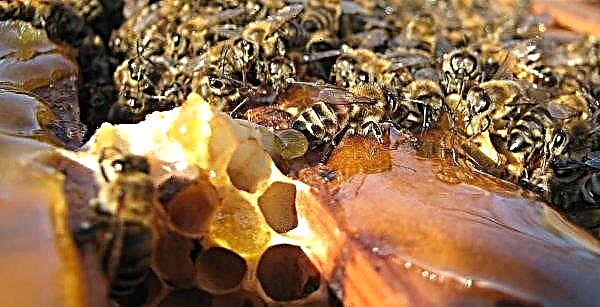The main task of farmers is keeping birds in comfortable and safe conditions, one of which is protection against various infectious diseases and parasites. Without timely preventive measures, they are capable of causing huge losses, which is why caring for chicks is literally important from the very first hours of life. Antibiotics, which include Metronidazole, an effective tool for the prevention and elimination of diseases, will help get rid of dangerous ailments. We will take a closer look at its composition, pharmacological properties, side effects, as well as storage conditions and methods of use.
Description of the drug Metronidazole
Metronidazole is an antiparasitic drug that has a wide spectrum of antibacterial action. Having an adverse effect on parasites and anaerobic bacteria, the medicine is able to remove pathogens from the body of the bird within 3 days in a natural way. It also acts as a prophylactic that prevents the symptoms of the disease at an early stage.
It is widely used to treat the following diseases common in poultry farming:
- histomoniasis - characterized by a decrease in productivity, refusal of food, diarrhea, general weakness and a sharp loss of weight;
- coccidiosis - an infectious disease, accompanied by exhaustion, inactivity, modification of plumage and feces;
- trichomoniasis is a particularly dangerous ailment, manifested by damage to the respiratory tract, which makes it difficult to eat food, and then breathe, and as a result entails suffocation.
 It is made synthetically, on sale it looks like tablets and white powder. The drug is effectively used as not only an internal, but also an external agent, for example, for disinfecting wounds and damage to the skin of turkeys.
It is made synthetically, on sale it looks like tablets and white powder. The drug is effectively used as not only an internal, but also an external agent, for example, for disinfecting wounds and damage to the skin of turkeys.Structure
Basically, Metronidazole tablets are used to treat birds, less commonly, an injection or powder. The tablets of the drug are cylindrical in shape, have a white or slightly greenish tint; each contains:
- active substance metronidazole - 250 g;
- additional substances: corn starch, microcrystalline cellulose, stearic acid, povidone, talcochlorite.
Release form
Since the times of the Soviet era, the medicine has been very popular and has been successfully used to treat not only birds, but also people, therefore it is sold in a variety of forms, namely in the form of:
- pills - 30 pieces per pack;
- infusion solutions - 1 bottle in a box;
- creams for external use - 30 g in a tube;
- candles - 7 pieces in one cell package;
- granulate - 0.5 g per plastic bag.

Pharmachologic effect
Metronidazole is one of the drugs that have antibacterial and antiprotozoal effects; it is especially effective against protozoan parasites and anaerobic microorganisms. After taking it, it is capable of destroying bacterial cells as soon as possible, without affecting healthy ones. The following microorganisms are most sensitive to antibiotic:
- dysenteric amoeba;
- intestinal lamblia;
- vailonella;
- Trichomonas;
- histomonad;
- gardnerella.
Important! Slaughter of birds treated with Metronidazole may be carried out no earlier than a week after the last intake, otherwise the meat of such an individual is suitable only for meat and bone food for animals.
It is completely excreted within 72 hours along with excrement, which acquire a specific dark red color. The medicine proved to be an effective method of treatment, including for chicks, so timely treatment will provide turkeys with good prevention, and farmers with a healthy and productive population.
Indications and contraindications
It should be remembered that it is still not worthwhile to independently engage in the treatment of birds without prior consultation and direct prescription of a specialist, since improper use of the drug can only aggravate the course of the disease. In most cases, metronidazole is fairly easily tolerated by birds and has no special restrictions.
Indications for use of the drug:
- infections caused by simple parasites: trichomoniasis, balantidiasis, amoebic dysentery, coccidiosis, toxoplasmosis, urethritis;
- infections caused by anaerobic bacteria;
- infections affecting the nervous system, joints and bones: meningitis, encephalitis, infectious arthritis, osteomyelitis, empyema;
- diseases of the gastrointestinal tract;
- acute inflammation of the large intestine (against the background of prolonged use of antibiotics).
Contraindications:
- organic brain damage;
- hepatic and renal failure;
- leukopenia;
- pregnancy;
- hypersensitivity to the drug;
- combination with other antibiotics.

Dosage and Administration
Metronidazole effectively eliminates symptoms at an early stage of the disease - however, how to give it depends on the age and purpose of the reception. Typically, the dose per bird is 15 mg per kilogram of live weight per day, but important factors such as the concentration of the substance and the nature of the disease should be taken into account - for this antibiotic, these rules must be observed without fail.
The use of the drug can be carried out in several ways:
- Water the birds with Metronidazole solution, counting the active substance at a dose of 10 mg per kilogram of live weight 2 times a day - in the case of the smallest it is best to use a pipette. Feeding birds in this way takes 10 days.
- Pour the medicine into feed or water, while it is necessary to dilute the drug at 2.5 g of powder per kilogram of grain or 2.5 g per 3 l of water, however, the dosage depends on the intensity of feed intake by the bird.
- Metronidazole is also given in tablets, previously ground into powder. The percentage of medication will be determined by the weight of the bird.

For treatment
For each ailment, there are peculiarities of the use of the drug, however, the main condition is the timeliness of medical procedures, otherwise the disease will spread at lightning speed and lead to the death of the entire livestock.
Histomonosis
Histomoniasis is an extremely dangerous disease that affects turkey poults, as a rule, from 10 days to two months of age, and the adult population is practically not susceptible to the disease. It is characterized by damage to the liver and gastrointestinal tract, however, histomonosis is not so easy to recognize because of the similarity of its symptoms with other diseases, therefore, laboratory tests are carried out to identify it.
The most characteristic features include the following:
- general deterioration in the well-being of poultry, decreased productivity and appetite, and immobility;
- dirty and disheveled plumage, lowered wings;
- low body temperature;
- diarrhea;
- in rare cases, blackening of the scalp may occur.
 Liver of a turkey affected by histomoniasis The disease requires immediate preventive measures and treatment, since it quickly covers the entire number of birds on the farm. Turkeys are treated for histomonosis within a week by mixing Metronidazole with food - the dosage will be 30 mg per kilogram of live weight.
Liver of a turkey affected by histomoniasis The disease requires immediate preventive measures and treatment, since it quickly covers the entire number of birds on the farm. Turkeys are treated for histomonosis within a week by mixing Metronidazole with food - the dosage will be 30 mg per kilogram of live weight.Coccidiosis
Coccidiosis is one of the most common diseases of turkeys, to which young animals are susceptible from the first days of life. For this ailment, digestive system disorders of the chicks and a complete failure of the liver are characteristic, and in an adult livestock the disease can be asymptomatic.
Did you know? Turkeys lack ears and sense of smell, but hearing and taste buds are well developed.
The main symptoms of coccidiosis that you should pay attention to:
- sharp weight loss;
- gait of turkeys becomes uncertain, coordination is disturbed at an advanced stage;
- feathers are untidy, dirty, chicks are most often scruffy and ruffled;
- lethargy and inactivity;
- yellow droppings mixed with blood;
- in some cases, paralysis of the extremities also occurs.
 In case of coccidiosis infection, treatment is carried out in the following way: for 5 days, the medication is poured into the feed at a rate of 25 mg per kilogram of bird weight. It is not recommended to dissolve Metronidazole in water, since it settles at the bottom, which significantly reduces its effectiveness.
In case of coccidiosis infection, treatment is carried out in the following way: for 5 days, the medication is poured into the feed at a rate of 25 mg per kilogram of bird weight. It is not recommended to dissolve Metronidazole in water, since it settles at the bottom, which significantly reduces its effectiveness.Trichomoniasis
This disease is characterized by a defeat of the digestive tract of turkey poultry, as well as the occurrence of characteristic ulcers on the mucous membranes. Young animals are especially susceptible to the disease, starting as early as 20 days of age, and in the absence of timely treatment, the probability of death is almost one hundred percent. Outbreaks of trichomoniasis are observed on those farms where turkeys are particularly often in contact with wild birds, and infection also occurs through dirty household items, food and water.
The manifestations of the disease are as follows:
- decreased appetite and subsequently a complete rejection of food;
- turkey poults look tired, hardly move, feathers are constantly ruffled, wings are lowered;
- excrement is liquid, yellow or green, diarrhea is also observed.
 For the treatment of trichomoniasis, the drug is used not only inside, but also externally - in this case, it is necessary to treat the affected areas with a 1% solution. The dosage of metronidazole is calculated based on the weight of the bird - 35 mg of medication per kilogram of weight. The duration of the course will be from three to six days.
For the treatment of trichomoniasis, the drug is used not only inside, but also externally - in this case, it is necessary to treat the affected areas with a 1% solution. The dosage of metronidazole is calculated based on the weight of the bird - 35 mg of medication per kilogram of weight. The duration of the course will be from three to six days.Sinusitis
Sinusitis, that is, a runny nose, is an infectious disease that manifests itself in the form of inflammation of the respiratory tract. An ailment is able to affect turkey poults from the second week of life, which subsequently significantly affects their growth and development, so the treatment does not allow delay. Pathogenic bacteria feel great in soil, water and air, so infection in birds can occur from already infected individuals, through food and dirty equipment.
Important! Usually, when mixing the medicine with food, the chicks do not distinguish it, however, in case of refusal of turkey poults from food, which can also be a symptom of the disease, it is necessary to feed them by force.
Other causes of sinusitis can also be increased humidity in the room, the lack of vitamins and walking in chicks. The symptoms of this disease are as follows:
- active mucous discharge from the nasal openings;
- shortness of breath and wheezing;
- a sharp deterioration in vision, chicks can hardly move and can not find food on their own;
- lack of appetite, zero productivity and swelling under the eyes.
 As an independent drug, Metronidazole is not used to treat sinusitis. At the chronic stage of the disease, drugs such as Tilosin and Farmazin are used, which, if improperly dosed, have an extremely negative effect on the immunity of turkey poultry, therefore they require a mandatory consultation of a specialist. The best way to prevent the disease is timely prevention, and if a sick bird is found on the farm, it is urgently isolated and an entire livestock is examined.
As an independent drug, Metronidazole is not used to treat sinusitis. At the chronic stage of the disease, drugs such as Tilosin and Farmazin are used, which, if improperly dosed, have an extremely negative effect on the immunity of turkey poultry, therefore they require a mandatory consultation of a specialist. The best way to prevent the disease is timely prevention, and if a sick bird is found on the farm, it is urgently isolated and an entire livestock is examined.Tuberculosis
Tuberculosis is one of the most dangerous diseases of poultry, since it affects all the internal organs of birds and does not provide any treatment - a fatal outcome is inevitable. Turkeys become infected with tuberculosis from direct contact with representatives of other bird species, and the disease immediately becomes chronic.
Important! Without compliance with the sanitary conditions of keeping birds, the drug will be ineffective.
The causative agent immediately affects the respiratory system, after which it enters the liver, spleen, heart and other organs. The most obvious signs of the disease are a sharp depletion and a complete lack of productivity, feathered apathetic and do not show any interest in what is happening around them. Other symptoms include:
- characteristic ulcerative lesions on the skin;
- muscle atrophy, in rare cases, lameness;
- the bird constantly freezes and seeks shelter in the warmth;
- increased drowsiness.
 Since the spread of infection occurs at lightning speed, treatment for tuberculosis is not expected either by metronidazole or by any other antibiotics. If a bird manifests at least one of the above symptoms, it is immediately killed and the room is disinfected.
Since the spread of infection occurs at lightning speed, treatment for tuberculosis is not expected either by metronidazole or by any other antibiotics. If a bird manifests at least one of the above symptoms, it is immediately killed and the room is disinfected.For prophylaxis
Metronidazole has proven itself both as a prophylactic and even among farmers with a healthy livestock is very popular, because any disease is better to prevent than to treat. Dosages for the prevention of diseases of turkey poults are significantly different, so you should pay attention to these indicators. The norm of the drug to prevent histomonosis will be 15 mg per kilogram of the weight of the chick for two to five days.
As in the case of treatment, the drug is mixed with food. For the prevention of coccidiosis, the dosage is as follows: 25-30 mg per kilogram of live weight, the drug is fed by mixing with food every two weeks for four days until the chick reaches a month old. In the case of trichomoniasis, the medicine for prophylactic purposes is not used. To prevent the disease, it is worth providing the livestock with high-quality content and feeding regimen.
How to enhance the effect of the drug
It should be reported that without proper compliance with hygiene requirements, no antibiotics, including Metronidazole, will give a positive result. In addition to the regular cleaning and disinfection of rooms that contain livestock, the right diet and feeding regime for the birds, as well as the temperature regime, are necessary. Other important care conditions include the following:
Other important care conditions include the following:
- newborn chickens should be kept exclusively warm, the ideal daytime temperature for them is 25–27 ° С, and at night these indicators rise by 2–3 degrees;
- as far as possible it is necessary to limit the contact of turkey poultry with representatives of other bird species, especially if they have already been ill with any disease;
- young animals must be kept separately from adults;
- the bird with the slightest hint of malaise should immediately be isolated and examined for the presence of the alleged disease;
- It will also not be amiss to take care of the prevention of other, equally unpleasant ailments of turkey poults, for example, diarrhea. From yellow diarrhea, a drug with chloramphenicol will effectively be used, about the dosage it is necessary to consult a doctor;
- avoid crowding of birds - the room should be spacious, well ventilated and preferably sunny;
- litter should be clean and periodically change.
Did you know? In total, turkeys need about 16 hours a day to rest: during the day, their continuous rest should be at least two hours four times a day, and at night — 9 hours of sleep.
Side effects
Metronidazole extremely rarely gives any side effects, since it is well absorbed by the body of the bird, even with a slight excess in dosage. In some cases, an allergic reaction may occur, which is due to increased sensitivity to the drug, however, as such, intolerance to the drug is not observed at the beginning or at the end of the dose. However, abuse of the drug entails the appearance in young animals of a fungal disease - candidomycosis, which provokes damage to the mucous membranes in birds.
However, abuse of the drug entails the appearance in young animals of a fungal disease - candidomycosis, which provokes damage to the mucous membranes in birds.
Storage conditions
The drug must be stored in a dry, cool, dark place at a temperature of no higher than 25 ° C. Shelf life of the drug is 3 years. It is advisable to use it before the expiration date indicated on the package.
Analogues of the drug
Despite the fact that Metronidazole is one of the most effective means of eliminating diseases in the poultry industry, it is not the only one able to cope with this task. We advise you to pay attention to a number of other, no less powerful substitutes for the drug:
- Metrogil - successfully used to treat diseases caused by bacteria susceptible to metronidazole. This product is available in the form of tablets and a solution for injection.
- Flagil - An analogue of metronidazole, marketed in the form of suppositories. Nevertheless, in case of intolerance to Metronidazole itself, the use of such a substitute will also be prohibited.

- Rosex - this medication is ideal for lovers of ointments, since its effectiveness is quite high, and there are practically no side effects. The drug is strictly forbidden to use for leukopenia, meningitis and renal failure.

- Bacimex - An effective analogue of metronidazole in the form of a solution for injection. It is used for various infections of the nervous system, gastrointestinal tract, joints and bones.
Metronidazole has long been a proven, safe and effective means to eliminate and prevent a number of diseases to which young birds, particularly turkeys, are most susceptible. However, no medicine can replace a livestock with proper care, so in order for the drug to remain active against parasites and germs for as long as possible, it is necessary to adhere to simple sanitary standards and be sure to consult a doctor.




